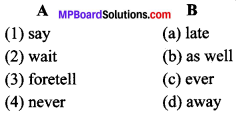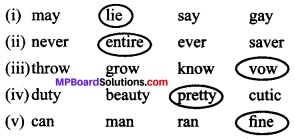MP Board Solutions for Class 9 Textbook General English The Spring Blossom Solutions Chapter 4 Today and Tomorrow Questions and Answers aids you to prepare all topics in it effectively. You need not worry about accuracy of Madhya Pradesh State Board Solutions for Class 9 English Composition: Visual Stimulus as they are given adhering to latest exam pattern and syllabus guidelines. You Can Download MP Board Class 9 English Solutions Questions and Answers, Notes, Summary, Guide pdf on is page. Enhance your subject knowledge by preparing from Chapterwise MP Board Solutions for Class 9 English and clarify your doubts on corresponding topics.
MP Board Class 9th General English The Spring Blossom Solutions Chapter 4 Today and Tomorrow
Kick start your preparation by using our online resource Madhya Pradesh State Board Solutions for Class 9 Textbook General English The Spring Blossom Solutions Chapter 4 Today and Tomorrow. You can even download MP Board Solutions for Class 9 English free of cost rough direct links available on our page. Clear your queries and understand concept behind in a simple manner. Simply tap on concept you wish to prepare chapterwise and go rough it.
Today and Tomorrow Textual Exercises
Word Power
(i) Match the following words with the rhyming ones
(सुमेलित कीजिए)

Answer:
(1) → (d)
(2) → (a)
(3) → (b)
(4) → (c)
(ii) Give antonyms of the following words
(विलोम शब्द दीजिए)
Answer:
- give – take
- late – early
- always – never
- few – many
(iii) Complete the following lines of the poem
(कविता की निम्न पंक्तियों को पूरा करिए।)
Answer:
Every moment has its duty.
Who the future can foretell?
Then, why put off till tomorrow.
What today can do as well?
How Much Have I Understood?
Answer these questions
(निम्न प्रश्नों के उत्तर लिखिए)
Question 1.
What does the poet mean by saying, “every moment has its duty”?
(व्हॉट डज़ द पोएट मीन बाइ सेइंग, ‘एव्री मोमेन्ट हैज़ इट्स ड्यूटी?)
‘हर क्षण का कर्तव्य होता है। उससे कवि का क्या तात्पर्य है?
Answer:
It means that there is something to be done every moment. Each moment is precious and is to be used in something useful.
(इट मीन्स दैट देअर इज़ समथिंग टू बी डन एव्री मोमेन्ट। ईच मोमेन्ट इज़ प्रेशिअस एण्ड इज़ टू बी यूज्ड इन समथिंग यूज़फुल।)
इसका अर्थ है कि हर क्षण कोई न कोई कार्य करना होता है। हर क्षण कीमती है व किसी उपयोगी कार्य में उपयोग होना चाहिए।
Question 2.
What type of man does the poet want?
(व्हॉट टाइप ऑफ मैन डज़ द पोएट वॉन्ट?)
कवि किस प्रकार का व्यक्ति चाहता है?
Answer:
The poet wants a man who does his work on the very day and not puts off till tomorrow what he can do the same day.
(द पोएट वॉन्ट्स अ मैन हू डज़ हिज़ वर्क ऑन द वैरी डे एण्ड नॉट पुट्स ऑफ टिल टुमारो व्हॉट ही कैन डू द सेम डे।)
कवि ऐसा व्यक्ति चाहता है जो अपना कार्य उसी दिन करे व कल पर न छोड़े।
Question 3.
How can we control the present?
(हाउ कैन वी कन्ट्रोल द प्रेजेण्ट?)
हम वर्तमान को कैसे नियन्त्रित कर सकते हैं?
Answer:
We can control the present if we act and never wait.
(वी कैन कन्ट्रोल द प्रेजेन्ट इर्फ वी एक्ट एण्ड नेवर वेट।)
हम वर्तमान को नियन्त्रित कर सकते हैं अगर हम बिना प्रतीक्षा किए सदैव कार्य करते रहें।
Question 4.
Why should we not throw the hours away?
(व्हाय शुड वी नॉट थ्रो द आवर्स अवे?)
हमें समय को बर्बाद क्यों नहीं करना चाहिए?
Answer:
We should not throw the hours away because that which can be accomplished today can never be accomplished tomorrow.
(वी शुड नॉट थ्रो द आवर्स अवे बिकॉज दैट व्हिच कैन बी एकम्प्लिश्ड टुडे कैन नेवर बी एकम्प्लिश्ड टुमारो।)
हमें समय बर्बाद नहीं करना चाहिए क्योंकि जो हम आज प्राप्त कर सकते हैं वो कल बिल्कुल नहीं कर सकते।
Question 5.
What does the word foretell mean?
(व्हॉट डज़ द वर्ड ‘फोरटेल’ मीन?)
पूर्व कथन शब्द का क्या अर्थ है?
Answer:
The word foretell means to know or say what will happen in the future, especially using magic powers.
(द वर्ड फोरटेल मीन्स टु नो और से व्हॉट विल हैपन इन द फ्यूचर, इस्पेश्यली यूजिंग मैजिक पावर्स।)
शब्द पूर्व कथन का तात्पर्य है कि किसी जादुई शक्ति से वह बताना या जानना कि भविष्य में क्या होने वाला है।
Question 6.
Give the central idea of the poem.
(गिव द सैन्ट्रल झडिया ऑफ द पोऍम।)
कविता का केन्द्रीय भाव दीजिए।
Answer:
The poet says that we should not put off till tomorrow what we can do today. The time once lost never returns. Nobody knows what the future has in store. We should not let precious moments go waste. We should make full use of the present.
Listening Time
(a) Supply the missing words in the following sentences
(निम्न वाक्यों में लुप्त शब्द दीजिए।)
- Radium is one of the rarest of …………
- The discoverer of this magic metal was
- She ……… born in ………. in the ……….. 1877.
- She lost ………… when she was only …………. old.
- This was a ………… blow to her
Answer:
- metals
- Madam Curie
- was, Poland, year
- her mother, ten years
- terrible.
(b) Encircle the odd words in each series.
(विषम शब्दों पर गोला लगाइए।)
Answer:

Speaking Time
Discuss the visit of Prabhat with one of your friends. Use the following questions.
(अपने मित्र प्रभात की सैर की चर्चा अपने किसी मित्र से करो। निम्न प्रश्न पूछो।)
Answer:
You will get the following answers
Question 1.
When did he go there?
वह वहाँ कब गया?
Answer:
He went there on 22 July, 2014.
वह वहाँ 22 जुलाई, 2014 को गया।
Question 2.
Where did he go?
वह कहाँ गया?
Answer:
He went to Sanchi.
वह साँची गया।
Question 3.
How did he go there?
वह वहाँ कैसे गया?
Answer:
He went there by train.
वह वहाँ रेल से गया।
Question 4.
What monuments did he see there?
उसने वहाँ कौन-से स्मारक देखे?
Answer:
He saw big and small stupas there.
उसने वहाँ बड़ा व छोटे स्तूप देखे।
Question 5.
How many days did he stay there?
वह वहाँ कितने दिन रहा?
Answer:
He stayed there for a single day, for eight hours.
वह वहाँ आठ घण्टे रहा।
Writing Time
(1) Prepare your daily routine.
(अपना दैनिक कार्यक्रम लिखिए।)
Answer:
My Daily Routine
I wake up at 5’clock in the morning. After my morning activities I go for a walk and return at around 6.30 a.m. Then I have my breakfast and tea and read newspaper. After bath I sit for studies at 7.30. I study till 10 O’clock. Then at 10 I take my meals and go to school. I return from school at 5 o’clock: In the evening I play with my friends for sometime then I watch ‘T.V. I sometimes listen to the radio and read magazines or books. At 9 O’clock, I have my dinner and from 9.30 to 11 O’ clock I study again. After that I go to sleep.
(2) Write the poem “Today and Tomorrow’ in prose form in your notebook.
(कविता को गद्य की तरह लिखो)
Answer:
Students can do themselves.
(छात्र स्वयं करें।)
Things to do
Question 1.
Suppose it is Sunday. Discuss with your friends about their schedule for that day and the next day. Talk to them the next day and list the items of work they have done or the books they have read.
Answer:
Students can themselves discuss it with their friends.
(छात्र स्वयं करें।)
Question 2.
Collect a poem having the similar idea and read it out in the class.
Answer:
Students can find a poem in books from library or from their friends and read it.
(छात्र स्वयं करें।)
Today and Tomorrow Central Idea of the Poem
The poet says that we should not put off till tomorrow what we can do today. The time once lost never returns. Nobody knows what the future has in store. We should not let precious moments go waste. We should make full use of the present.
Today and Tomorrow Difficult Word Meanings
deed (575)-a thing that somebody does कृत्य; command (कमान्ड) to control नियन्त्रित करना; repetance (रिपेन्टेन्स)-the fact of showing that you are sorry for something wrong that you have done पश्चाताप करना; phantom (फैन्टम)-athing that exists in your imagination काल्पनिक वस्तु; accomplish (एकम्प्लिश)-to succeed in doing or completing something सम्पन्न करना; foretell (फोरटेल)-to know or say what will happen in the future, especially by using magic powers भविष्यवाणी करना।
Today and Tomorrow Summary, Pronunciation & Translation
[1] Don’t tell me of tomorrow,
.Give me the man who’ll say
That, when a good deed’s to be done,
‘Let’s do the deed today.”
(डोंट टेल मी ऑफ टुमारो;
गिव मी द मेन हू’इल से ट्रैट,
व्हेन अ गुड डीड’स टु बी डन,
“लेट्स डू द डीड टुडे।”)
हिन्दी अनुवाद :
मुझे आने वाले कल के बारे में मत बताओ मुझे वह व्यक्ति दो जो यह कहे कि जब कोई अच्छा काम करना है तो उसे आज ही कर डालो।
[2] We may all command the present,
If we act and never wait,
But repentance is the phantom
Of a past that comes too late!
(वी मे आल कमाण्ड द प्रेजेन्ट,
इफ वी एक्ट एन्ड नेवर वेट,
बट रिपेन्टेन्स इज द फेन्टोम,
ऑफ ए पास्ट कम्स टू लेट।)
हिन्दी अनुवाद :
हम सभी वर्तमान को अपने वश में कर सकते हैं यदि हम कार्य करते रहें और प्रतीक्षा न करें। परन्तु पश्चाताप एक काल्पनिक वस्तु है जो बहुत देर से आता है।
[3] Don’t tell me of tomorrow,
There is much to do to-day,
That can never be accomplished,
If we throw the hours away.
(डोंट टेल मी ऑफ टुमारो,
देअर इज़ मच टु डू टुडे,
दैट केन नेवर बी एकमप्लीज़्ड
इफ वी थ्रो द अवर्स अवे।)
हिन्दी अनुवाद :
मुझे (आने वाले) कल के बारे में कुछ मत बताओ, हमारे पास वर्तमान में बहुत कुछ करने को है। अगर हम यूँ ही समय नष्ट कर देंगे तो हम कभी भी कुछ नहीं कर सकेंगे।
[4] Every moment has its duty,
Who the future can foretell?
Then why put off till tomorrow
What today can do as well? -J. E. Carpenter
(एवी मोमेन्ट हेज इट्स ड्यूटी,
हू द फ्यूचर केन फोरटेल?
देन व्हाय पुट ऑफ टुमारो
व्हाट टु डे केन डू एज़ वेल? -जे.ई. कारपेन्टर
हिन्दी अनुवाद :
हर क्षण में हमारा कोई न कोई कर्तव्य होता है, भविष्य के बारे में कोई क्या भविष्यवाणी कर सकता है। तो फिर जो काम हम आज अच्छी तरह कर सकते हैं उसे कल पर क्यों डालें।
We believe information shared regarding MP Board Solutions for Class 9 Textbook General English The Spring Blossom Solutions Chapter 4 Today and Tomorrow Questions and Answers as far as our knowledge is concerned is true and reliable. In case of any queries or suggestions do leave us your feedback and our team will guide you at soonest possibility. Bookmark our site to avail latest updates on several state board Solutions at your fingertips.